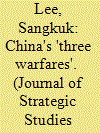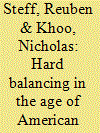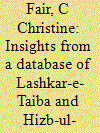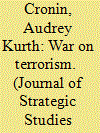|
|
|
Sort Order |
|
|
|
Items / Page
|
|
|
|
|
|
|
| Srl | Item |
| 1 |
ID:
131338


|
|
|
|
|
| Publication |
2014.
|
| Summary/Abstract |
Entering the twenty-first century, China has demonstrated an assertive foreign policy, not only in employing various types of economic and military leverage but also in conducting the Three Warfares (??) - psychological warfare, public opinion warfare, and legal warfare. This article attempts to identify the motives and methods of China's Three Warfares by analyzing its history, logic, and agents. Based on this analysis, the author also presents the position of the Three Warfares in China's foreign policy and the warfares' impact on the international security environment involving other major powers and China's neighbors.
|
|
|
|
|
|
|
|
|
|
|
|
|
|
|
|
| 2 |
ID:
131339


|
|
|
|
|
| Publication |
2014.
|
| Summary/Abstract |
One of the central debates in contemporary international relations scholarship concerns the issue of whether balancing has occurred in response to US-based unipolarity, and if it has, how this should be characterised. Existing research has seen analysts argue that major power responses to unipolarity can be placed in one of either three categories: an absence of balancing, soft balancing, and hard balancing. This article contributes to the scholarly literature by providing a case study of hard internal Russian balancing against the US's development and deployment of Ballistic Missile Defense (BMD) systems during the Bush Administration (2001-08). Russian hard balancing against the US has involved: (1) fielding new strategic nuclear and conventional weapons equipped with BMD countermeasures, and, relatedly, (2) making changes in military doctrine. As a result, security dilemma dynamics are increasingly in evidence in US relations with Russia.
|
|
|
|
|
|
|
|
|
|
|
|
|
|
|
|
| 3 |
ID:
131342


|
|
|
|
|
| Publication |
2014.
|
| Summary/Abstract |
Most theories of war and peace in the modern world, whether they acknowledge it or not, emerge from three historical questions. Why did the First World War break out? Was Hitler's Germany - and its murderous campaign of domination and destruction - unique? And how do nuclear weapons affect international relations? Coming first and producing a seemingly inexhaustible inheritance that vexes geopolitics to this day (think Syria), no international relations scholar can avoid wrestling with the causes of what was once called the Great War.
|
|
|
|
|
|
|
|
|
|
|
|
|
|
|
|
| 4 |
ID:
131340


|
|
|
|
|
| Publication |
2014.
|
| Summary/Abstract |
This article uses a novel database of 1,625 posthumously published biographies of members of two Islamist militant organizations (Lashkar-e-Taiba (LeT) and Hizb-ul-Mujahideen (HM)), all of whom were killed in the course of carrying out militant attacks. In general, each biography provides data on the militant's birthplace, education, recruitment, and training. The number of observations in this database is a full order of magnitude larger than those of previous databases assembled from militant biographies. While the sample of militants in this database is the product of multiple selection effects, analysis of the database undermines many common myths about Pakistani militants and casts doubt on current policy approaches to mitigating Islamist militancy in Pakistan.
|
|
|
|
|
|
|
|
|
|
|
|
|
|
|
|
| 5 |
ID:
131341


|
|
|
|
|
| Publication |
2014.
|
| Summary/Abstract |
This article constructs a taxonomy of the various ways that national security policy-makers attempt to use history. It identifies four types of history: experience, memory, tradition, and study. It then defines and describes three categories of how history is used in national security policy: predictive, prescriptive, and existential. Each category is distilled further into specific manifestations. The article agrees with existing scholarship that policy-makers often misuse history, but argues that nevertheless policy-makers engage with history in more diverse and complex ways than are commonly understood. Thus before scholars attempt to critique and improve the manner in which policy-makers use history, we should first employ a more sophisticated understanding of the multiple ways that policy-makers approach history in the first place.
|
|
|
|
|
|
|
|
|
|
|
|
|
|
|
|
| 6 |
ID:
131337


|
|
|
|
|
| Publication |
2014.
|
| Summary/Abstract |
The war on al-Qaeda and its affiliates appears to be endless but every war must end. Winding down the conflicts in Afghanistan and Iraq has been difficult, but both were embedded in what was then called the 'war on terrorism.' What does 'success' in that war mean? With the death of bin Laden and the increase in drone operations, how far is the US from achieving it? Can this war end? The article analyzes the ongoing US response to the 9/11 attacks in historical context, revealing four patterns common to all prolonged wars: means become ends, tactics become strategy, boundaries are blurred, and the search for a perfect peace replaces reality. It concludes by laying out an effective strategy for ending the war.
|
|
|
|
|
|
|
|
|
|
|
|
|
|
|
|
|
|
|
|
|